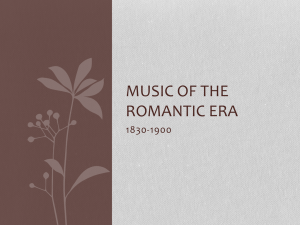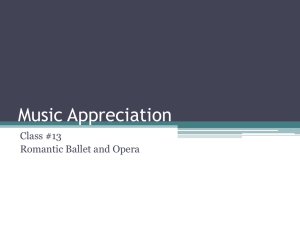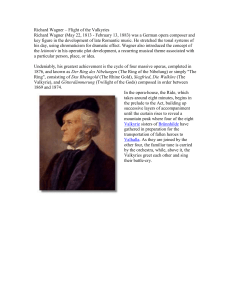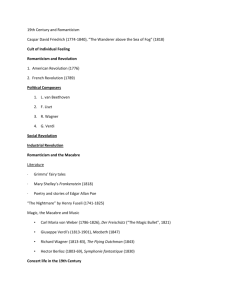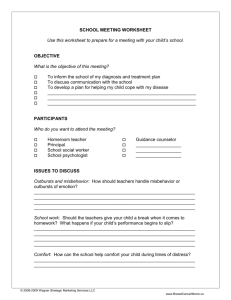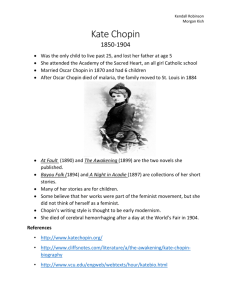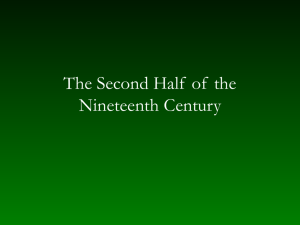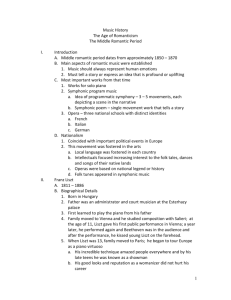The lonely artist is surrounded by frivolous society.
advertisement
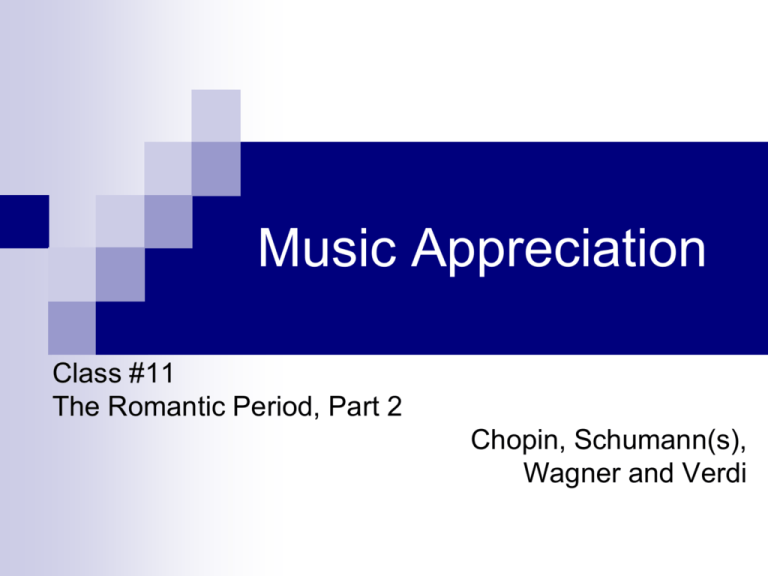
Music Appreciation Class #11 The Romantic Period, Part 2 Chopin, Schumann(s), Wagner and Verdi Frédéric Chopin* (1810-1849) Web sites http://www.chopin.pl/spis_tresci/index_en. html http://www.chopin.org/ip.asp?op=Home Nationalism* Folk tunes Harmonies Influence: Wagner, Liszt Forms Dedications “Revolutionary Etude” (“November Uprising” 1830) Sviatoslav Richter Heart* Style New musical language Originality Exclusivity* 170+ for piano alone No news! Careful edits Melody! Chopin’s Life In Paris Composer Performer Teacher Bon Vivant Celebrity Parisian Friends Franz Liszt Hector Berlioz Vincenzo Bellini Felix Mendelssohn Ferdinand Hiller Heinrich Heine Salon society Schubert abend concerts Social, musical, political, intellectual gathering Personality “The lonely artist is surrounded by frivolous society.” “Romantic” appeal? Romance Women as inspiration Piano Concerto #1 dedication: “I have not yet exchanged a syllable with her of whom I dream every night. While my thoughts were with her I composed the Adagio of my concerto”. Aurore Duvedant... or George Sand? Feminist! "I know that I am the slave and you the lord. The law of the land has made you my master....you have the right of the stronger party, and society confirms you in it; but over my will, sir, you are powerless." Odd couple Prude vs. exhibitionist Frail vs. healthy Demure vs. aggressive Confidence, intellect, sexuality Inspiration 21 Nocturnes* Artur Rubinstein John Field (1782-1837) 21st Century The “Minute” Waltz*, CD #2, Track 4 Listen for… Virtuoso technique “Singing” quality in the melody Robert Schumann (1810-56) Romantic ideal Dichter Poet, writer Denker Philosopher Law student Friedrich Wieck Romantic paradox Whimsical and refined Dreamy and gritty Vehement and visionary “Scenes From Childhood” Träumerei Horowitz in Moscow And even…Katharine Hepburn in“Song of Love” The Wild Horseman Health 4th finger, Right Hand* Physical health Mercury? Syphilis? Mental health* Visions Institutionalized Musical pyramid* Only composer to master compositions on one instrument (the piano) before proceeding to larger compositions; Only solo piano compositions for over 8 years; 1st orchestral composition not until 1842; Difficult with large structures. Cultural Accomplishments Davidsbündler * (“The League of David”) “Philistines!”* Florestan und Eusebius Neue Zeitschrift für Musik”* (“The Journal of New Music”) 1st musical journal/criticism New composers/styles Chopin and Brahms Clara Wieck Schumann* (1819-1896) Limitations... "I once believed that I possessed creative talent, but I have given up this idea; a woman must not desire to compose — there has never yet been one able to do it. Should I expect to be the one?" * “The High Priestess of Music” Father & Teacher 60-year “amateur” career Highly accomplished performer Inspiration Robert’s most passionate music 150 songs in 1840 alone! Influenced and Encouraged Mendelssohn, Brahms, Chopin Musician, Wife, Mother Finances Concerts Teaching Premieres Eight children “Revolution of Dresden” rescue Rumors... “Symphony #1: Larghetto” CD #2, Track 5 Listen for… Full orchestral score Intricate harmonies Importance of melody Richard Wagner* (1813-1883) Biography Step-father’s influence Composition training Beethoven Bach Opera as drama Gesamtkunstwerk* “Complete art work” Total synthesis of Music Drama Theater Dance Politics Thirteen complete “music dramas” http://wagneroperas.com/indexwagneroper as.html Leitmotif* Musical idea or Melody Associated with Character Event Prop Idée fixe and Ritornello Hector Berlioz and Antonio Vivaldi Symphonie Fantastique & Four Seasons “Mad” King Ludwig II* King Ludwig and Wagner Admirer Musical and personal Patron Saved Wagner’s career? “Swan King” Lohengrin Neuschwanstein Bayreuth Festspielhaus* Mecca for Wagnerites Replacement for Easter/Church Complete “Ring” cycle Hidden Orchestra pit* Der Ring des Nibelungen* (1848-74) Das Rheingold (The Gold of the Rhine) Creation of the Ring Die Walküre (The Valkyries) Siegfried Götterdämmerung (Twilight of the Gods) Introduction and Background http://www.youtube.com/watch?v=haO3BeuE_0s&feature=related Ring Cycle Facts Libretto German, Scandinavian and Norse myth 34 characters God(s) vs. humans Aryan culture vs. Jewish “threat” Music 15 hours Through-composed Die Walküre* (2nd opera in the cycle) God*+ (Wotan or “Wälse”) God’s children on earth in human form Siegmund*+ “victory” + “mouth” (“shield”) Sieglinde*+ “victory” + “gentle” Background Winter Storm*+ Wandering, nameless stranger*+ Hunding*+ Mystery guest*+ at the wedding*+ Tree*+ with a Sword*+ (“Notung”) Bayreuth : Jeanine Altmeyer and Peter Hoffman End of Act 1 Wehwal asks Sieglinde to grant him a name; They realize that they have the same father, (Wälse = God), and that they are twin brother and sister; Sieglinde names him Siegmund; Siegmund is then empowered to pull Notung out of the tree; The two declare their love for each other. God in Human Form The Wagner ideal Sieglinde and Siegmund Sister/bride and Brother/groom “Now let our race flourish and continue!” Siegfried*+ (“Victory” + “Freedom”) (Savior/Führer /Leader) Wagner’s Essays Anti-Semitic Sexist Socialist Inspiration for Nazis The Ring and Star Wars http://www.trell.org/wagner/starwars.html Cosima Liszt von Bülow Wagner* Cosima (1837-1930) Relationship with Franz Liszt* Schooling Musical education Hans von Bülow* Favored conductor Liszt and Wager Married Cosima (two children) Richard Wagner Affair and three illegitimate children Marriage and four children Mrs. Wagner Disowned by Liszt Denounced by von Bülow “Frau Wagner” Age difference: 24 years Three children Bayreuth Festival Director and producer: 31 years Anti-Semite Bayreuth, then and now “Ride of the Walküres” CD #2, Track 6 Listen for… Enormous orchestra Emphasis on the brass section Epic quality Continual repeats Giuseppe Verdi* (1813-1901) Giuseppe Verdi “Il Re d’Italia”* (“The King of Italy”) Vittorio Emanuele Re D'Italia (Victor Emmanuel King of Italy) Nationalism* (il Risorgimento*) “Va, Pensiero”* Exiled slaves singing of their homeland Italy under Austrian occupation Career Almost 30 complete operas Shakespeare influence Rigoletto (1851)* Quartet Aida (1900)* Leontyne Price “La Traviata” Prelude CD #2, Track 7 Listen for… High, sustained string section Short, concise, dramatic Establishes a specific mood/emotion for the drama which will follow.
